Filter by

Core Concepts and Methods in Load Forecasting: With Applications in Distribut…
This comprehensive open access book enables readers to discover the essential techniques for load forecasting in electricity networks, particularly for active distribution networks. From statistical methods to deep learning and probabilistic approaches, the book covers a wide range of techniques and includes real-world applications and a worked examples using actual electricity data (includi…
- Edition
- 1
- ISBN/ISSN
- 978-3-031-27852-5
- Collation
- XV, 331
- Series Title
- -
- Call Number
- -
Emergent Trends in Robotics and Intelligent Systems Where is the Role of Int…
What is the Role of Intelligent Technologies in the Next Generation of Robots ? This monograph gives answers to this question and presents emergent trends of Intelligent Systems and Robotics. After an introductory chapter celebrating 70 year of publishing the McCulloch Pitts model the book consists of the 2 parts „Robotics“ and „Intelligent Systems“. The aim of the book is to contribute…
- Edition
- 1
- ISBN/ISSN
- 978-3-319-10783-7
- Collation
- 160 b/w illustrations
- Series Title
- -
- Call Number
- -

Human–Robot Intimate Relationships
The idea of humans falling in love with artificial beings is not a modern conception. Our relationship with artificial partners has come a long way since Pygmalion and his ivory lover. In recent years, there has been a strong upsurge of interest and discussions in the various aspects of intimate relationships between humans and artificial partners. This interest is evidenced by the increase in …
- Edition
- 1
- ISBN/ISSN
- 978-3-319-94730-3
- Collation
- Kedokteran/Robotik
- Series Title
- Human–Computer Interaction Series
- Call Number
- 629.8
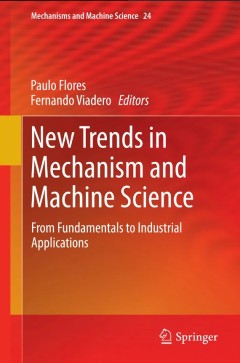
New Trends in Mechanism and Machine Science
This work presents the most recent research in the mechanism and machine science field and its applications. The topics covered include: theoretical kinematics, computational kinematics, mechanism design, experimental mechanics, mechanics of robots, dynamics of machinery, dynamics of multi-body systems, control issues of mechanical systems, mechanisms for biomechanics, novel designs, mechanical…
- Edition
- 1
- ISBN/ISSN
- 978-3-319-09410-6
- Collation
- XVII, 968
- Series Title
- Mechanisms and Machine Science
- Call Number
- -
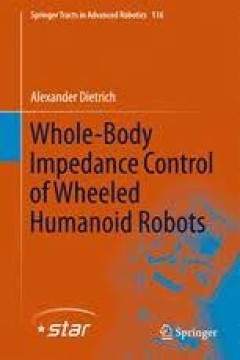
Whole-Body Impedance Control of Wheeled Humanoid Robots
Introducing mobile humanoid robots into human environments requires the systems to physically interact and execute multiple concurrent tasks. The monograph at hand presents a whole-body torque controller for dexterous and safe robotic manipulation. This control approach enables a mobile humanoid robot to simultaneously meet several control objectives with different pre-defined levels of priorit…
- Edition
- -
- ISBN/ISSN
- 978-3-319-40557-5
- Collation
- XV, 187
- Series Title
- -
- Call Number
- -
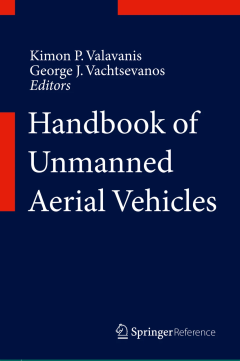
Handbook of Unmanned Aerial Vehicles
The Handbook of Unmanned Aerial Vehicles is a reference text for the academic and research communities, industry, manufacturers, users, practitioners, Federal Government, Federal and State Agencies, the private sector, as well as all organizations that are and will be using unmanned aircraft in a wide spectrum of applications. The Handbook covers all aspects of UAVs, from design to logistics an…
- Edition
- -
- ISBN/ISSN
- 978-90-481-9706-4
- Collation
- LXXIX, 3022
- Series Title
- -
- Call Number
- 621 HAN
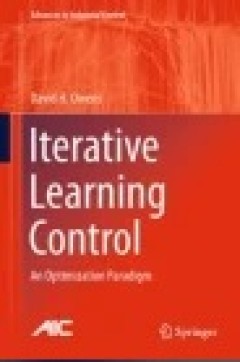
Iterative Learning Control: An Optimization Paradigm
This book develops a coherent and quite general theoretical approach to algorithm design for iterative learning control based on the use of operator representations and quadratic optimization concepts including the related ideas of inverse model control and gradient-based design. Using detailed examples taken from linear, discrete and continuous-time systems, the author gives the reader acce…
- Edition
- -
- ISBN/ISSN
- 978-1-4471-6772-3
- Collation
- -
- Series Title
- -
- Call Number
- -
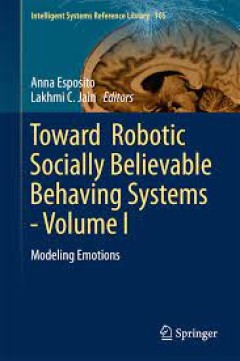
Toward Robotic Socially Believable Behaving Systems - Volume I
This volume is a collection of research studies on the modeling of emotions in complex autonomous systems. Several experts in the field are reporting their efforts and reviewing the literature in order to shed lights on how the processes of coding and decoding emotional states took place in humans, which are the physiological, physical, and psychological variables involved, invent new mathemati…
- Edition
- 1
- ISBN/ISSN
- 978-3-319-31055-8
- Collation
- XVI, 240
- Series Title
- Intelligent Systems Reference Library
- Call Number
- -

Introduction to Evolutionary Computing
The overall structure of this new edition is three-tier: Part I presents the basics, Part II is concerned with methodological issues, and Part III discusses advanced topics. In the second edition the authors have reorganized the material to focus on problems, how to represent them, and then how to choose and design algorithms for different representations. They also added a chapter on problems,…
- Edition
- -
- ISBN/ISSN
- 978-3-662-44874-8
- Collation
- -
- Series Title
- -
- Call Number
- -
 Computer Science, Information & General Works
Computer Science, Information & General Works  Philosophy & Psychology
Philosophy & Psychology  Religion
Religion  Social Sciences
Social Sciences  Language
Language  Pure Science
Pure Science  Applied Sciences
Applied Sciences  Art & Recreation
Art & Recreation  Literature
Literature  History & Geography
History & Geography